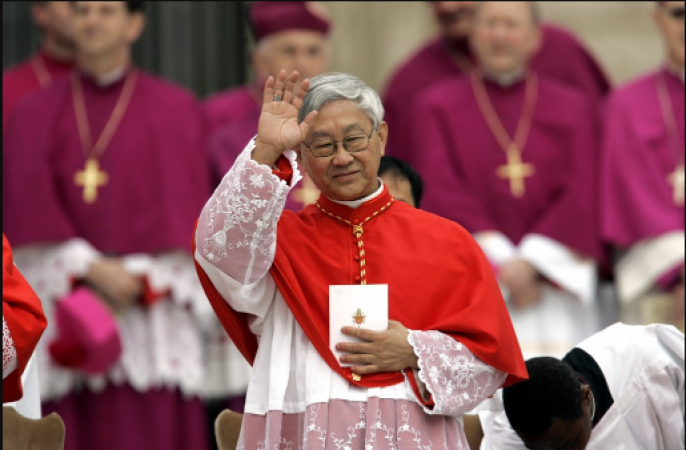
Beijing: The Vatican's strained relations with Communist-ruled China were highlighted by the fact that both a former Hong Kong bishop and an adviser to Taiwan's president attended the funeral of Pope Emeritus Benedict XVI this week.
The Chinese government, which does not formally maintain diplomatic relations with the Vatican, has made no statement regarding Benedict's passing and did not send a representative to Thursday's funeral.
Pope Francis, who replaced Pope Benedict in 2013, has made efforts to improve relations with Beijing, moving from his predecessor's hardline stance to signing an agreement on the appointment of bishops in China in 2018. Still, the Vatican is one of the few. The remaining governments maintain diplomatic relations with Taiwan instead of China.
Former Hong Kong bishop, Cardinal Joseph Jane, who attended the funeral, strongly criticized the agreement on bishops. This week, he praised Benedict, who promoted Zane to cardinal in 2006. He did so in an Italian blog post.
Zen, 90, who was detained last year after going after Hong Kong authorities for his involvement in the now-quiet democracy movement, wrote that "he could not accept any compromise."
Zen expressed gratitude for Benedict's efforts to establish a strong commission to manage the affairs of the Chinese Church, as well as the letter he sent in 2007 inviting China's Catholics to unite under his leadership.
Organized religion in China is tightly controlled by the Communist Party in power, which sees it as a potential threat to its hold on absolute power. Institutions that follow party rules allow people to worship there. Underground churches established by Christians are illegal and subject to persecution by the authorities.
The agreement on Catholic prelates has been extended twice, most recently in October last year for two more years. A dispute over the establishment of an auxiliary bishopric in Jiangxi Province began a month later, and the Vatican was involved.
The full terms of the agreement have never been made public, but Francis has said he has the final say in the appointment of bishops. The Vatican describes the agreement as being incomplete but expresses hope that it will eventually result in better living conditions for Chinese Catholics.
Also Read: Emergency UN meeting to be held regarding Israeli visit to holy site
Jen was detained in May under a national security law that Beijing imposed in the wake of significant pro-democracy protests in 2019 on suspicion of plotting with foreign forces.
He has not yet been formally charged, but in a separate case in November, he and five others were fined for failing to register a now-defunct fund set up to aid detained protesters. I went. He had to apply to the court earlier this week for permission to leave the city as police confiscated his passport following his arrest.
Chen Chien-Jen, a devout Catholic former official from Taiwan, will attend Benedict's funeral in a special capacity. He is a scientist who served as the chair of President Tsai Ing-wai Wen from 2016 to 2020 after serving as Minister of Health.
Chang Chia-lin, a professor of religious studies at Alethea University in Taiwan, insisted that sending Chen had more symbolic significance than sending the country's current ambassador to the Vatican.
Chang claimed that Benedict had a friendlier attitude towards China than Pope John Paul II. Benedict, who attempted but failed to contact Beijing, signaled the beginning of the Vatican's turn toward China.
John Paul viewed Hong Kong and Taiwan as a way to reach Chinese Catholics.
During a civil war in 1949 the Communists seized power and the defeated nationalists fled to Taiwan, China and the island of Taiwan.
China refuses to establish diplomatic ties with countries that have formal ties with the self-governing island because it still views Taiwan as part of its territory. Only 14 nations, including the Vatican, recognize Taiwan as a country independent of China. According to Lawrence Reardon, a political science professor at the University of New Hampshire, the Vatican maintains its ties with Taiwan because China has not yet demonstrated its "sincerity" in allowing the Vatican to protect the interests of Chinese Catholics. .
Reardon claimed that China's lack of response and refusal to arrange for President Xi Jinping to meet with Francis in Kazakhstan in September are indicative of Xi's attitude towards the Vatican-Beijing agreement on bishop appointments.
He claimed that Xi Jinping was trying to take back control of the party-state by undermining the influence of all religions and Taiwan's position in the world.
According to Francesco Sisci, a China-Vatican relations expert at Settimana News, a Catholic research institute in Italy, the lack of connections makes it difficult for China to send a representative to a papal funeral.
China didn't send anyone to John Paul's funeral in 2005, but in a lesser-known incident, a delegation from the Foreign Ministry privately paid their respects to his body, according to Sisci. He said it might take place once more, though the ongoing COVID-19 outbreak in China might make things more difficult.